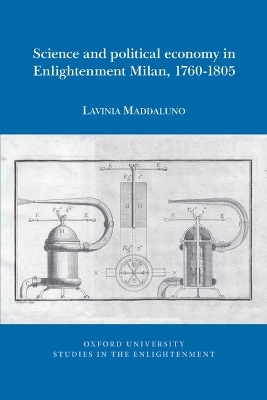
Science and political economy in Enlightenment Milan, 1760-1805
Voltaire Foundation (Verlag)
978-1-83553-404-5 (ISBN)
This book is about the parlance of political economic ideas with scientific practices in the Duchy of Milan, from the late eighteenth-century Habsburg monarchy to the early nineteenth-century Napoleonic era. It advocates for a shift in perspective from the history of ideas of political economy to the history of scientific practices, as an innovative methodological stance, to offer a more articulated understanding of how political economic ideas circulated and were appropriated in Europe and Milan between the eighteenth and early nineteenth centuries. In sum, the book asserts that the making and enforcement of political economic ideas into policies could not be possible without the mediation of scientific practices, and draws on a number of concrete examples to substantiate this claim. Following approval, policies had to be tested; tests involved practitioners such as mechanicks, artisans, bakers and land surveyors, alongside institutions. These figures, mostly kept out of the picture of eighteenth-century political economy; built machines to grind grain in a Physiocratic fashion; drained marshes to realise Joseph II’s plans of economic improvement; surveyed abandoned mines as a way to embrace Cameralist conceptions of the state; and wrote chemistry manuals as a celebration of Republican values and models of production. It was these figures, mostly kept out of the picture of eighteenth-century political economy, built machines to grind grain in a Physiocratic fashion; drained marshes to realise Joseph II’s plans of economic improvement; surveyed abandoned mines as a way to embrace Cameralist conceptions of the state; and wrote chemistry manuals as a celebration of Republican values and models of production. More broadly, this book also situates the Duchy of Milan at the centre of European transfers of political economic knowledge, delving into the broad interconnections between ideas and technological practices in the Enlightenment.
Lavinia Maddaluno (PhD, Cantab.) is an early modern historian working at Ca’ Foscari University (Venice). Her expertise crosses the history of science and intellectual history, with a focus on early modern Europe. Her research received support from the EUI, the Warburg Institute, Villa I Tatti, the FMSH (Paris) and the Fondazione Einaudi.
Acknowledgments
Abbreviations
List of figures
Introduction
Actors
The meaning of scientific practice
Competing traditions in political economy
Scientific practices and political economic reforms
Chapter I
Milling the economy: bread making practices and ersatz in eighteenth-century mila
Landriani as a go-between
Father carrara’s bakery and barraco’s machine
Maize and economic milling
Chapter II
From economic machines to public happiness
Beccaria and the measure of the enlightenment
Pasta, bread making presses and “intermittent” lumi
Mechanical artefacts and the state
Galilean and cameralist echoes
Chapter III
Perpetuating private property: machines and hydraulics
Miglioramento, language and economia rustica
Castelli’s hydraulics
D’alembert and progress
The “character of sovereigns”
The ventilatore idraulico
Spaces of political economy: natural history, mineralogy and wealth
Domenico vandelli’s survey of valsassina (1763)
Vandelli’s travel journal: cameralism, curiositas and utilitas
Shifting to mineralogy and the soil
Networks of natural history knowledge
Action, history and projectors
Chapter V
Visions of the soil between enlightened reforms and the napoleonic period
The ispettorato per i nitri e le polveri
From roman to milanese soil
Creating saltpetre expertise
Spaces of rural economy: the soil and its fertility
Conclusion
Starting with grain, ending with the soil
Bibliography
Manuscript sources
Printed sources
Editions of sources
Secondary sources
| Erscheinungsdatum | 09.09.2024 |
|---|---|
| Reihe/Serie | Oxford University Studies in the Enlightenment ; 2024:10 |
| Verlagsort | Liverpool |
| Sprache | englisch |
| Maße | 156 x 234 mm |
| Themenwelt | Geisteswissenschaften ► Sprach- / Literaturwissenschaft ► Anglistik / Amerikanistik |
| Geisteswissenschaften ► Sprach- / Literaturwissenschaft ► Literaturgeschichte | |
| Geisteswissenschaften ► Sprach- / Literaturwissenschaft ► Literaturwissenschaft | |
| Sozialwissenschaften ► Soziologie | |
| ISBN-10 | 1-83553-404-X / 183553404X |
| ISBN-13 | 978-1-83553-404-5 / 9781835534045 |
| Zustand | Neuware |
| Haben Sie eine Frage zum Produkt? |
aus dem Bereich


